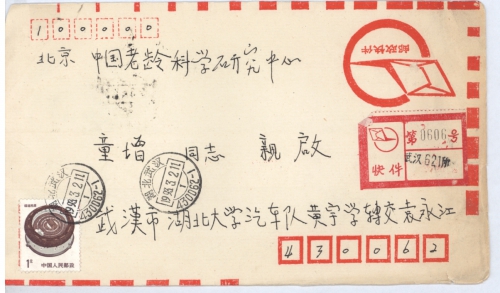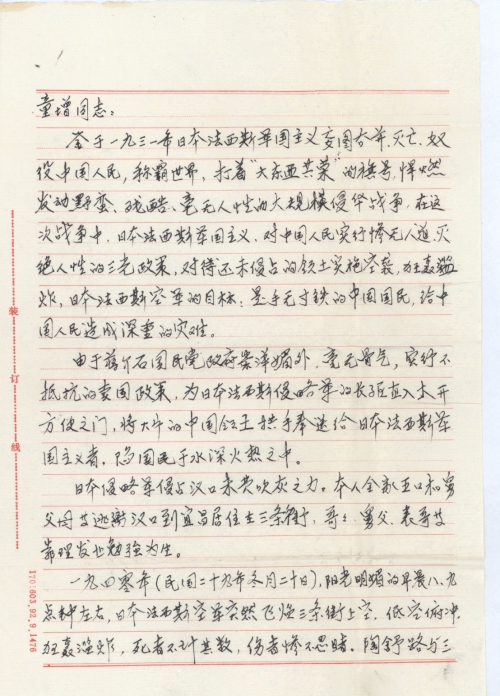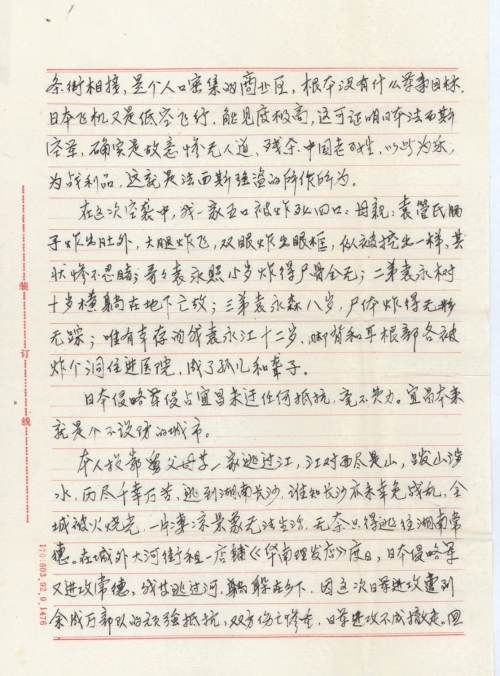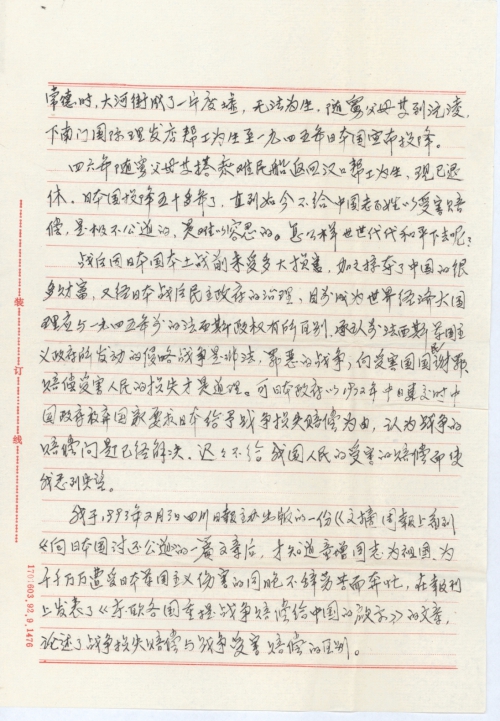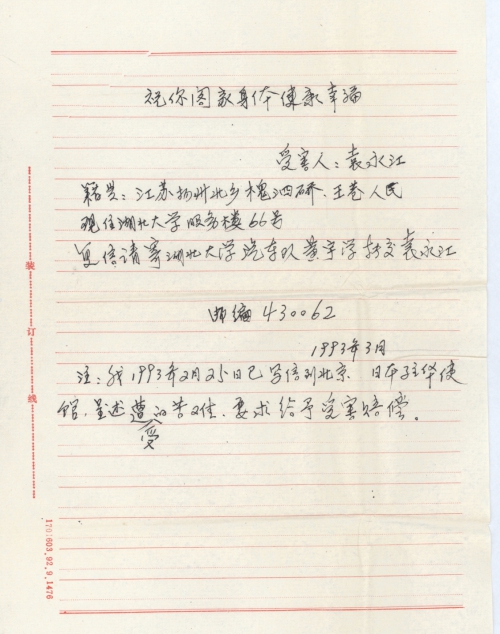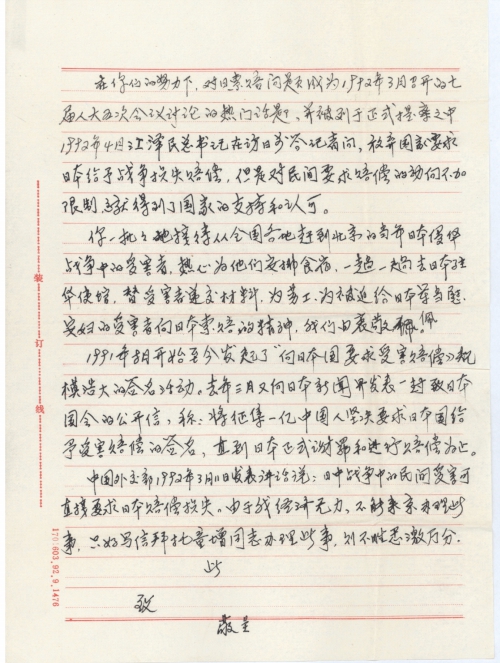Date of letter:1993-03
Address of author:Wuhan City, Hubei Province
Date of event:1940-12-20(lunar calendar)
Location of event:Yichang City, Changsha City, and Changde City of Hubei Province
Name of author:Yuan Yongjiang
Name(s) of victim(s):Yuan Yongjiang and Yuan’s wife Guan (Yuan Yongjiang’s mother), Yuan Yongzhao (Yuan Yongjiang’s elder brother), Yuan Yongshu (Yuan Yongjiang’s younger brother), Yuan Yongsen (Yuan Yongjiang’s younger brother)
Type of atrocity:Air Bombings (AB)
Other details:In 1940, the Japanese aircrafts suddenly flew over the three streets, dived and bombed at low altitude, killing countless people. Of my family of five, four were killed in the bombing: my mother, elder brother, two younger brothers all died miserably. Only I survived as a deaf orphan, with my instep and ears injured. I made an arduous journey to go and seek refuge with my uncle in Changsha. Unexpectedly, the city was burned and looked miserable. I had to flee to Changde, but it lay in ruins after the Japanese attack. The Japanese government must compensate and apologize for the suffering of my family and me.
Comrade Tong Zeng:
In 1931, Japanese fascist militarism launched a cruel, inhuman war of aggression against China under the banner of “Greater East Asia Co-Prosperity” to swallow, eliminate and enslave the Chinese people and rule the world. Japanese militarists implemented the inhuman Three Alls policy towards the Chinese people and heavily bombed our land. The target of the Japanese Air Force was unarmed Chinese civilians. The war is a great disaster to the Chinese people.
The spineless Chiang’s Nationalist government invited the Japanese militarists in and handed over Chinese territory to them by implementing a traitorous policy of non-resistance, making the Chinese people live in misery.
The invading Japanese army easily occupied Hankou. My 5-member family and my uncle and aunt, etc. escaped from Hankou to Yichang and lived in Santiao Street, where my elder brother, uncle and cousin ran a haircut business to make a living.
At about 8 a.m. or 9 a.m. one a sunny morning in 1940 (December 20 in the 29th year of National Republic of China), Japanese planes flew above the sky of Santiao Street to heavily bomb the city, causing countless casualties. Santiao Street, adjacent to Taoshu Road, was a populated business district without military targets. Besides, the Japanese planes flew at a low height with good visibility. It proved that the Japanese Air Force purposefully killed Chinese civilians for pleasure and acted as fascist robbers.
During this air aid, 4 of my 5 family members were killed. My mother Mrs. Yuan, née Guan had her intestines out and legs broken and her eyeballs were bombed out of the eye sockets like they were gouged out. It was too horrifying to look at. My 15-year-old eldest brother Yuan Yongzhao had his body parts everywhere. My 10-year-old second youngest brother Yuan Yongshu died on the ground. I couldn’t find the corpse of my 8-year-old youngest brother Yuan Yongsen. As the only survivor, I (Yuan Yongjiang, then 12 years old) was hospitalized due to injury in my instep and ear and became a deaf orphan.
The invading Japanese army effortlessly occupied the undefended city of Yichang because they met no resistance.
I followed my uncle and aunt to escape to Changsha, Hu’nan by going through difficulties, but unexpectedly, Changsha became a burned and desolate city. We couldn’t live there, so we had to escape to Changde, Hu’nan. We opened a Southern China Barber’s Store in Dahe Street outside the city to make a living. But then, the Japanese army attacked Changde. We crossed the river to hide in the countryside. The Japanese army met stubborn resistance of Yu Chengwan’s troops and both sides suffered heavy casualties. The Japanese army retreated. When we returned to Changde, Dahe street became ruins and we couldn’t live there anymore. So I followed my uncle and aunt to Yuanling and worked for Xiananmen International Barber’s Store to make a living until Japan surrendered in 1945.
In 1946, I returned to Hankou with uncle and aunt by taking a refugee ship where I worked as a helper to make a living. I am now retired. It’s been over 50 years since Japan’s surrender. It’s so unfair and intolerable that Japan hasn’t compensated Chinese civilians. How could we maintain a friendship for generations to come?
As Japan has grown into an economic power thanks to a less-damaged territory in the war, plunder of much wealth from China and post-war governance by the democratic government, Japan should differentiate it from the fascist regime before 1945 by admitting that the war of aggression against China launched by the fascist militarist government is illegal and evil and apologizing and compensating to Chinese victims. But disappointedly, Japan believes that the compensation issue is settled and delays in compensating Chinese victims on the grounds that the Chinese government gave up war reparations in 1972 when establishing diplomatic relations with Japan.
It wasn’t until I read the article Pursuing Justice Against Japan from Weekly Digest of February 3, 1993 launched by Sichuan Daily that I knew that Comrade Tong Zeng is working hard for our country and thousands of victims of Japanese militarism and has published an article titled Enlightenment of Eastern European Countries’ Bringing up Again the Issue of War Reparations to China, in which he explained the difference between war reparations and damage compensation.
Wish your family healthy and happy.
Victim: Yuan Yongjiang
Place of birth: Siqiaowang, Beixianghuai, Yangzhou, Jiangsu
Current address: No. 66, Service Building of Hubei University
Mailing address: Yuan Yongjiang in care of Huang Yuxue, Fleet of Hubei University
Postal code: 430062
March 1993
Note: I wrote a letter demanding compensation to the Japanese embassy in Beijing on February 25, 1993.
Thanks to your efforts, the issue of demanding compensation against Japan was discussed at the Fifth Session of the Seventh National People’s Congress in March 1992 and was listed as a formal proposal of the session. When replying questions of a Japanese reporter before his visit to Japan in April 1992, General Secretary Jiang Zemin said that China has given up the claim for war reparations against Japan, but hasn’t set any limit to civilian claim for compensation. So, we get national support and recognition.
You have received one after another victims of Japan’s war of aggression against China who came to Beijing from all over the country, arranged meals and accommodation for them and submitted materials for them to the Japanese embassy in China again and again. We greatly admire you for demanding compensation against Japan for forced laborers and those who were forced to be comfort women by the Japanese army.
In August 1991, you launched a massive signature campaign of “demanding damage compensation against Japan”. Last March, you published a public letter to the Japanese Parliament through the Japanese press, which states that we will collect 100 million Chinese people’s signatures of strongly demanding a damage compensation against Japan until Japan makes a formal apology and compensation.
A spokesperson of the Ministry of Foreign Affairs of China said in a speech on March 11, 1992 that, civilian victims of the Anti-Japanese war could directly demand compensation for losses against Japan. Due to my economic weakness, I cannot go to Beijing to handle the matter, so I have no choice but write a letter to comrade Tong Zeng and ask you to handle the matter for me. Thank you so much.
Best regards














